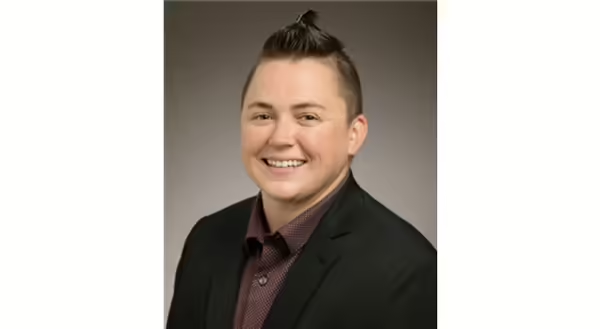
Name Courtney Cuthbertson
Pronouns they/them/theirs
Title Assistant Professor and Extension Specialist
Department Human Development and Family Studies and Extension
Research/Professional interests (keywords) social determinants of mental health and substance use; behavioral health literacy; impacts of community and social trauma; farm stress
How did you become interested in public engagement?
Throughout my master’s and doctoral programs I saw people researching important social issues, and I became interested in public engagement as a way to put my skills to use for community benefit. My disciplinary background in sociology helped to understand the variety of systems, interactions, and experiences that influence mental health outcomes. I started working with Extension in 2016, and in that work I experienced first-hand how research, teaching, and other academic skills can be used in applied settings. This was highlighted for me in research and outreach work I did with residents in Flint, Michigan, related to the water crisis. Research was a way to work together with community members, have their voices documented and heard, and to work towards positive change.
What kinds of engaged scholarship are you involved in now? (This can include community-engaged research, teaching, and/or outreach.)
I am currently working on several projects related to farm stress, including surveying and interviewing agricultural producers as well as working with Illinois Extension colleagues to provide mental health and stress management trainings and resources through the North Central Farm and Ranch Stress Assistance Center, a USDA-funded outreach-oriented project to facilitate sharing mental health information in the agricultural community. I am also involved in a multistate effort led by Purdue University to build and enhance community coalitions to prevent opioid misuse using a recovery-oriented systems of care framework.
Any recent successes or insights from your work?
Conducting trainings and workshops about mental health has allowed me to see how impactful the information was through participants learning a new skill or perspective about mental health, or even just having discussions about this often-stigmatized topic with others. It is incredible to hear from participants days, weeks, or months after offering a program that they used the information to help someone they know.
One success I experienced recently was that the proposal my colleague, Josie Rudolphi, and I wrote for the USDA North Central Farm and Ranch Stress Assistance Network was selected for funding. This large grant enables us to work with collaborators from all 12 states in the North Central region to share best practices, programs, and resources to improve mental wellbeing among agricultural populations. It is exciting to work together with others who are passionate about mental health.
One insight that continues evolving for me is about how important language is to connecting with community members about a topic. Mental health and suicide are topics that are often stigmatized, especially in the work I am doing related to agriculture. It has been important to find language that accurately conveys research-based information, breaks down stigma, and is approachable enough for people to still engage with the conversation, material, or resources.
What tips would you offer to other scholars looking to become involved in public engagement?
Public engagement is rewarding and complex. I think it is important for scholars considering public engagement to work with the public from the start of their research and/or outreach efforts to ensure they are able to accomplish what they hope or plan to. It’s also important to establish good relationships with community members, and to understand that community members are experts in their communities and about their own experiences. Publicly engaged scholars should be aware of how their own positionality, privilege, or marginalized statuses may impact work with community members, and should reflect on their experiences to minimize harm, even when unintended. The skills we have as scholars can be useful in applied settings, but only if we show up and listen first to understand.